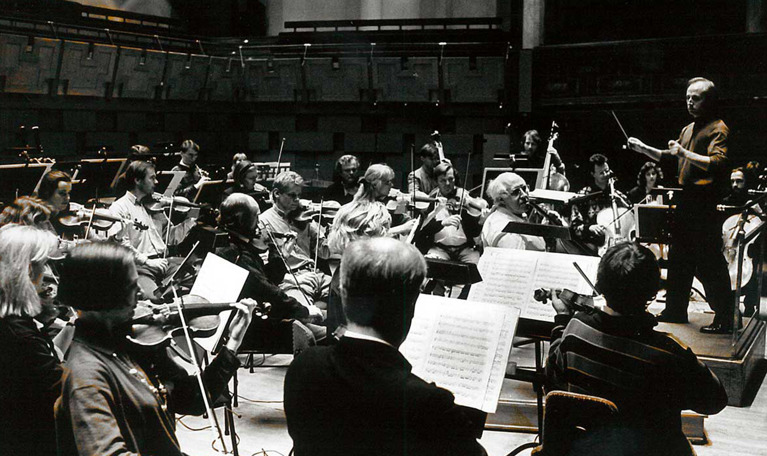Paavo Järvi & Andrew Davis

Paavo Järvi rehearsing with the orchestra.
Paavo Järvi and Sir Andrew Davis were the principal guest conductors from 1995–98. Järvi has conducted the orchestra in a total of 52 concerts and Davis in a total of 53 concerts.
For a while after Gennady Rozhdestvensky’s second term as chief conductor, the orchestra had no chief conductor. Primary responsibility came instead to rest upon two principal guest conductors: Paavo Järvi and Sir Andrew Davis. Järvi debuted with the orchestra in 1993, while since his debut in 1979, Davis had guest conducted the orchestra many times before and knew it well.
Not until 1998 did one of them, Paavo Järvi, lead the Royal Stockholm Philharmonic Orchestra on a larger European tour, when ten concerts were given in Prague, Metz, Kortrijk and more.
For short periods in the past, the orchestra had been without a true chief conductor – for example, during the gap between Schnéevoigt and Talich (1924–26), between Garaguly and Schmidt-Isserstedt (1953–55) and, not least, between Rozhdestvensky’s first period and Ahronovitch (1977–82).
But this period in the orchestra’s history was not particularly successful, and some critics say it was threatened by stagnation. Looking back, during his second period as chief conductor, Rozhdestvensky was also unable to bring new life to the partnership.
That period was also followed by the transitional solution of shared responsibility between the guest conductors Davis and Järvi from 1995–98, which was succeeded in turn by another few years without a chief conductor – until Alan Gilbert took over the position in 2000.
- 1997 One of the two principal guest conductors, Andrew Davis (now Sir Andrew Davis), conducted the Royal Stockholm Philharmonic Orchestra in three concerts in Zürich and two in Athens.
- 1998 The second of the two principal guest conductors, Paavo Järvi, led the Royal Stockholm Philharmonic Orchestra on a European tour with 10 concerts, with the finale in Concertgebouw in Amsterdam. Cellist Truls Mørk and trumpet player Håkan Hardenberger were soloists.
